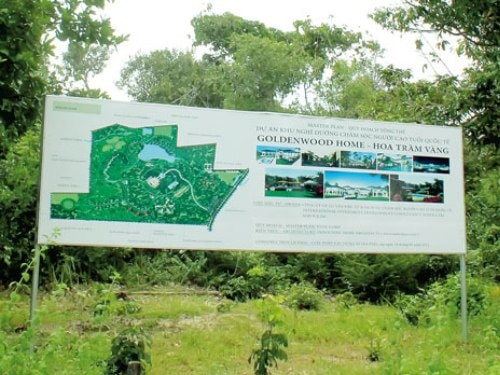"Suspended" planning, handling of planning personnel
Before the National Assembly votes to pass the Land Law (amended) on June 21, on June 17, the discussion session in the hall about this draft law "heated up" with frank comments from National Assembly deputies.

We need to boldly remove "suspended" planning (illustrative photo).
Land acquisition must take into account people's interests
Delegate Nguyen Thanh Thuy (Binh Dinh delegation) agreed with the view on land recovery stipulated in Chapter VI of the draft law because land is a special means of production resource owned by the entire people with the State representing the owner. Land use rights are a special type of property and commodity but are not ownership rights. Therefore, the regulation on the State exercising the right to recover land is completely appropriate.
However, the delegate said that in cases of land reclamation with houses and other properties attached to the land, the State must purchase it, because the State cannot consider this as compensation for properties attached to the land as a result of the land reclamation decision. Therefore, the delegate proposed to specifically stipulate in the law: "The State shall reclamation land and purchase houses and other properties attached to the land in cases of land use for national defense, security, national interests, public interests and implementation of socio-economic development projects".
Sharing the same view, delegate Tran Ngoc Vinh (Hai Phong delegation) asked: "Why don't we use the compulsory purchase mechanism or the agreement mechanism between businesses and people on compensation prices for this type of property?"
According to delegate Duong Hoang Huong (Phu Tho delegation), in addition to the cases mentioned in the draft above, there are also cases of land reclamation due to force majeure that seriously impact a specific area or land area, affecting the safety and lives of land users in that area. For example: Land subsidence has occurred due to geological fluctuations in many places. In this case, although the land user did not violate the land law, he may not voluntarily return the land because he was not fully aware of the risks that could occur. However, for the safety of people's lives and health, the State still needs to make a decision to repossess the land, and at the same time, is responsible for arranging resettlement land in a safe place and creating suitable conditions for production land for people whose land is repossess. Delegates proposed to add to Article 16, Chapter VI provisions on cases where the State reclaims land due to force majeure situations that may seriously affect people's lives and safety.
Regarding land recovery, delegate Le Thi Cong (Ba Ria - Vung Tau delegation) agreed with the land valuation method stipulated in Article 110 of the draft law. Accordingly, the land price during construction must be consistent with the common market price of land of the same purpose that has been successfully transferred through auction of land use rights or consistent with land use in cases where income is determined.
Major shortcomings in planning work
Delegate Huynh Nghia (Da Nang City delegation) pointed out: The implementation of planning and land use plans is the "hottest" issue today. Many projects, after announcing the planning, are implemented slowly; there are also projects that have been announced but then forgotten for many years, affecting the rights of the people, but no one has been reviewed or handled. Some suspended projects have caused dissatisfaction among the people, the land is left unused, not allowed for production, not allowed for people to build houses. This shows that this work still has many shortcomings.
On this issue, the draft law has not focused on fundamental adjustments. Specifically: Clause 3, Article 48 stipulates that if a project is announced within 3 years without a decision to reclaim the land, the competent authority must adjust or cancel the project; in case the competent authority does not announce the adjustment or cancellation of the project, the land user is not restricted in rights as prescribed in Clause 2, Article 48. Such a provision is not strong enough and does not ensure the feasibility of the law. The delegate suggested that the Drafting Committee consider handling the above provision to ensure the feasibility of the law. In addition, it is necessary to stipulate that whoever proposes a plan but fails to implement it must be responsible.
Agreeing with the viewpoint of delegate Huynh Nghia, delegate Tran Van Tan (Tien Giang delegation) proposed to supplement Article 164 on the general rights of land users with the following content: The State has a support policy for cases where land users in areas where land use planning and plans have been announced, have land areas that have been recovered and are damaged due to restrictions on land use rights.
Delegate Le Thi Cong (Ba Ria - Vung Tau delegation) said that land use planning and plans represent vision and future orientation. Therefore, land use planning must be based on the overall socio-economic development plan. Land use planning approved by competent authorities is the basis for other planning such as urban construction planning; sectoral planning; detailed planning to overcome current overlapping planning. It is necessary to unify land use planning for 10 years, land use plans for 5 years, and unify regulations on land use planning content at 3 levels (national, provincial and district levels). Abolishing commune-level land use planning is in line with administrative reform requirements, saving costs, human resources and time.
According to Baocongthuong-PH






